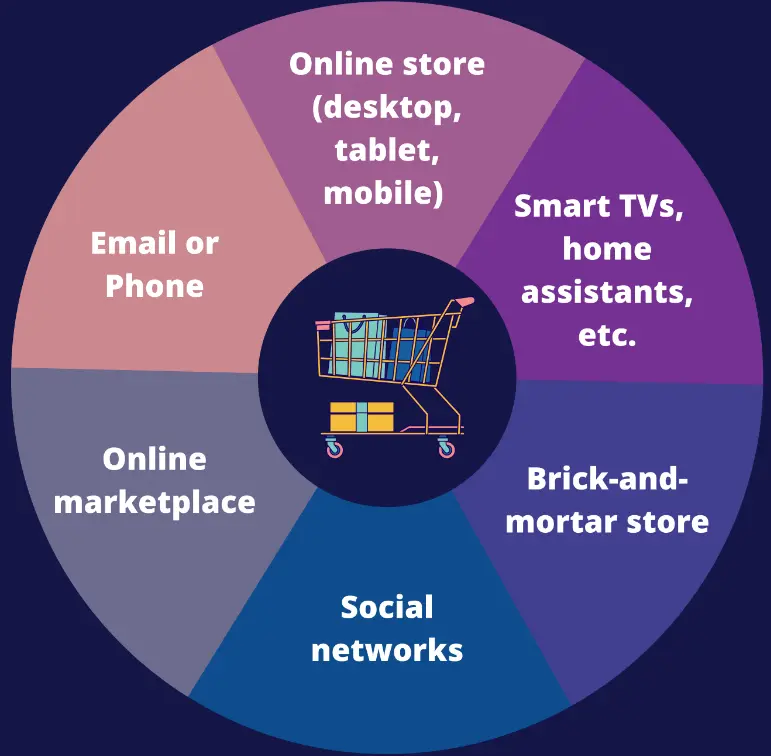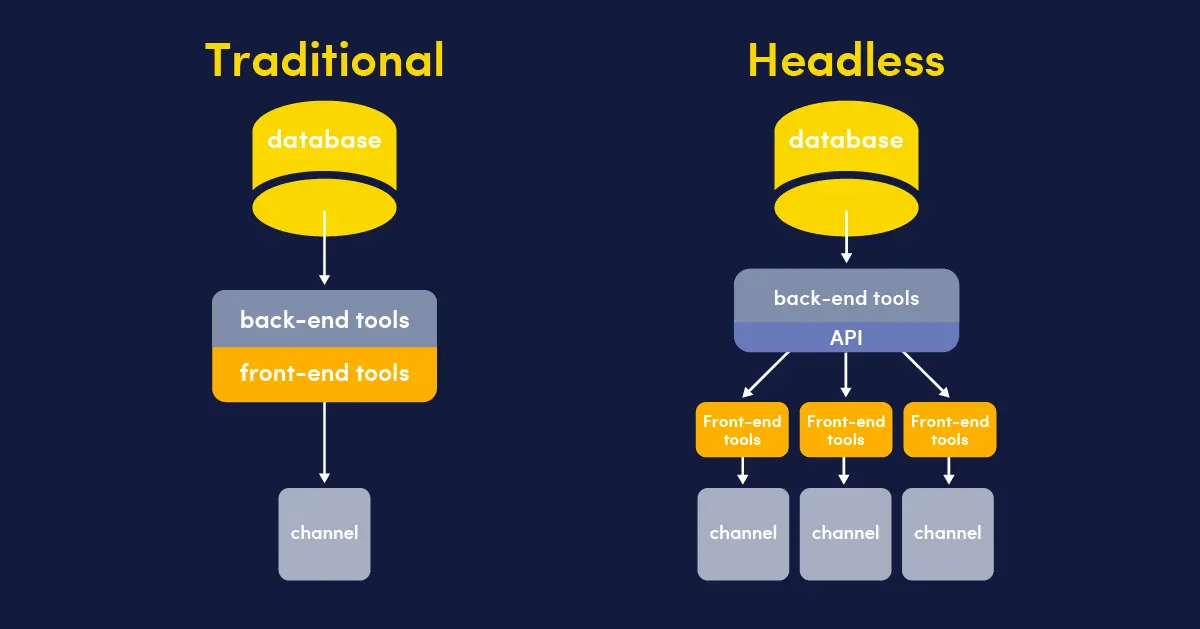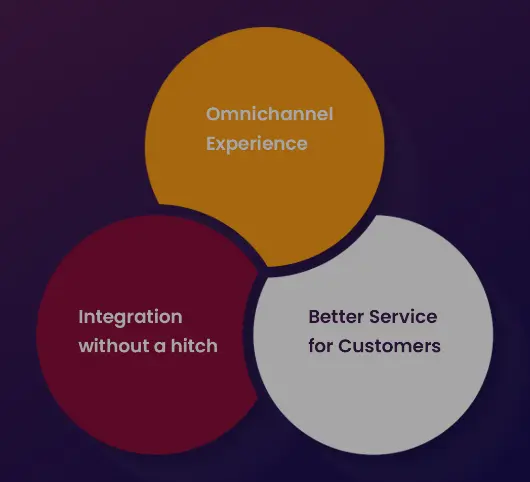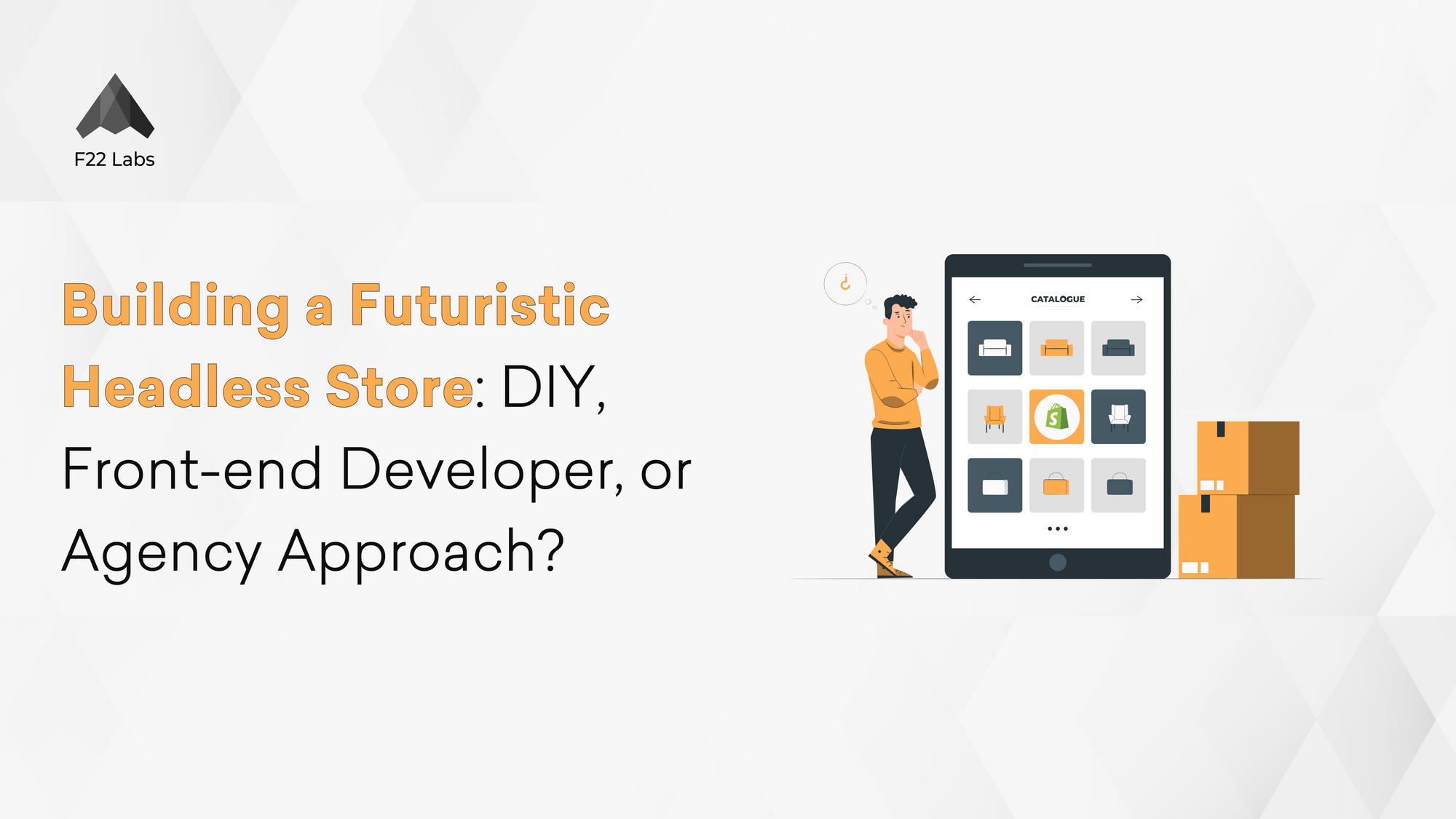Building a Futuristic Headless Store: DIY, Front-end Developer, or Agency Approach?
The present digital corporate landscape has become increasingly competitive. You must stay on top of the most recent developments in eCommerce solutions to stay relevant. About 74% of firms believe disregarding emerging commerce advancements will negatively affect their business.
While many companies adapt their model to the latest trends, some hesitate to be a part of the in-crowd. Why deviate from a recipe that gives you more confidence in pricing and delivering services?
It is clear that people consume content and make purchases on the go. About 50% of eCommerce transactions are cross-device. A startling 65% of users commence the journey on their smartphone before switching to a laptop or a tablet.
It is not only mobile phones and laptops anymore as users leverage devices like Amazon Echo, Google Home, and even smartwatches. Therefore, you must harness interactive, omnichannel experiences to entice customers and retain those relationships. That is where headless commerce comes into play.

Headless commerce gives you the freedom to tailor-make customer experiences. Around 77% of organizations using headless architecture claim it enables faster changes and modifications to storefronts. It consolidates content and delivers it wherever needed through API.
It removes information silos and puts all the customer shopping data at your fingertips. Accurate customer behavior allows you to customize purchase recommendations and promotions and present browsing options for a particular channel. And there, you have a simple way to improve conversion rates by feeding appropriate content to your users.
So, you want to switch your traditional Shopify website to a decoupled solution. That is great! But a headless store requires development, implementation, and maintenance, and you must decide how to create it.
You may have an in-house team, or you can hire front-end developers or an agency. How do you know the most suitable option for you?
This article outlines what the headless Shopify platform means and its benefits and lists multiple approaches to going headless. Please read ahead.
Understanding Headless Shopify
Various e-commerce platforms are available to assist budding startups and international brands. Shopify is the leading and among the most sought-after options for businesses.
With over 457 million buyers, it holds nearly 11% market share. Hence, it is no wonder that approximately 4 million eCommerce websites use Shopify.
Shopify is a cloud-based and fully hosted eCommerce platform. It puts forward an impressive selection of functionalities and features to aid online sales. It comprises a front end and a back end.
Before moving forward, understanding the key difference between them is necessary to grasp the concept:-
- Front-End: It is the user interface customers see and interact with when accessing your website, shopping app, or other channels.
- Back-End: The back end is like the behind-the-scenes side. It includes the tools and technologies that operate in the background. It ensures customers can purchase and have easy checkouts.
You can access sophisticated tools to manage orders, sales, inventory, and customer data. It is precisely what a business initially needs. The trade-off?
The front- and back-end interdependence makes it unsuitable for growing businesses to scale their operations.
In addition, the platform slows down anytime you add new apps to your setup. Website speed is not a matter of preference; it significantly contributes to your success. Ideally, a website should load within two seconds to keep users engaged. One in every four users passes over a website if it takes more than four seconds to load.
A headless solution offers faster page-load times and a mobile-friendly experience. What makes it pleasing and convenient? And is it possible to combine headless commerce with Shopify?
The headless architecture includes a decoupled front-end and back-end. It enables a modular development process.

Your website will employ various technologies to present the front end and use APIs to pull data from Shopify. It means your customers will no longer need to visit your store on the platform.
You can utilize your codebase, content systems, and templates, discarding limitations that influence your preferred functionality, feel, or look.
Benefits of Headless Shopify

Headless eCommerce Shopify is a feasible long-term solution to satisfy your customers. Although the initial setup is costly, it considerably accelerates operations and minimizes expenses in the long run. Some headless commerce advantages you will experience include the following:
1. Enhanced Flexibility and Personalization
Headless Shopify allows you to design and craft pleasant and unique user experiences across multiple touchpoints.
2. Improved Performance and Scalability
It equips your website with advanced capabilities and features to handle more traffic and transactions.
3. Smooth Integration
The platform offers the means to communicate with various tools via APIs and promotes seamless connections and transfers.
4. Increased Security and Control
You get more control over your website and can customize security measures to meet your specific requirements.
A headless technology thus provides superior customization, adaptability, and scalability to beat the competition. It encourages you to experiment with new technologies to innovate the front-end interface. The promising headless Shopify benefits only rationalize the thought of creating a headless store.
Headless commerce begins with a change in mindset and operations. It is a coordinator that will future-proof your business and unlock doors to new opportunities.
However, the transformation can be complex and overwhelming without adequate planning. Learning about the multiple ways you can build a headless eCommerce store is crucial to selecting the suitable technique.
DIY Approach: Building your own Headless Store
The perfect way to align the product with your business and gain control over the process is by doing it yourself. Do you have a dedicated in-house technical team to develop and deploy your new solution?
If yes, then here you have a viable strategy to start. You can define your requirements and expectations for your team and put your adept developers to work on it.
Headless commerce is all about leveraging APIs to integrate various software. Your team must have apt web development and programming skills to carry out the work. Additionally, they should be familiar with the headless architecture and eCommerce platforms that offer headless solutions.
Pros
- high-quality development
- Well-established communication and seamless management
- A better understanding of company processes, culture, and systems
Cons
- Expensive due to salary and overhead
- Limited technology and innovation
- Lack of diversity in the process
Overall, the DIY route requires a specialized and skilled team to do the job. Adequate skills and resources will make your transition to headless Shopify a breeze. It also offers the ultimate flexibility to develop and modify the platform whenever you desire.
However, developing the platform yourself also has some potential challenges. The development process can be complex as it requires more infrastructure. Further, scaling the team can be tricky when your business flourishes. The mismatch between available resources and business needs can delay the project.
Front-end Developer Approach: Collaborating with a Developer
Headless architecture provides a back-end layer and allows you to choose the front end. Website design is no longer confined to pre-defined templates the platform provides. It enables you to create and design a unique user experience and win customers.
A front-end developer builds the parts of the website users see. Studies claim customers take only 50 milliseconds to form an opinion about a website. A skilled developer keeps current trends in mind and creates UI (User Interfaces). UI is the graphical layout that determines the functions and appearance of each part of your application.
Pros
- Faster development time
- Enhanced user experience and conversion rates
- More secure and scalable platform
- Simplified maintenance and updates
A headless commerce front-end developer service is a pre-packaged solution consisting of all the necessary components your headless store requires. You can access out-of-the-box connections with Shopify, hosting, or CMS software. It takes the website development procedure off your plate. This way, your developers have time to handle complex tasks directly affecting the back end.
However, ensuring you hire a competent front-end developer is crucial to avail the benefits of headless commerce platforms. Communication and collaboration skills, experience, familiarity with popular frameworks, and ability to build modern and clean designs to lure users are some significant must-have qualities to assess when hiring a developer.
Agency Approach: Partnering with F22 Labs
An agency can assist you in creating a custom and tailored headless Shopify store setup. Hiring an agency does not mean handing over the reins. You must analyze whether your firm requires full- or partial support to execute the project. Besides development, an agency follows best practices that elevate digital marketing, SEO, and user experience.
Pros
- Allows you to change the team size as the project scales
- Access to top talent
- No additional overhead costs. For instance, partnering with F22 Labs saves you from spending money on resources and IT infrastructure.
F22 Labs is a renowned software company based in Chennai, serving clients worldwide. We began working on headless Shopify development in 2014 and have over 8-years of experience.
Our team of developers harbors formal education, effective communication, product knowledge, and soft skills and offers reliable service to build headless Shopify stores and deliver unforgettable user experiences.
We have worked with several startups and businesses to help them start their digital store. Our happy and satisfied clients include SkyMD, Frank Darling, Urdu Reader, Compatibility, and SumOfUs, among many others.
We aided businesses in migrating to a headless platform to enhance their performance and will be glad to help you with the same.
Benefits of Working With F22 Labs
- Our expert team assists you in developing user-centric UI to deliver customers value each time they visit your website.
- Every business has unique needs. We understand and meet the requirements of bespoke and custom solutions.
- API access via smooth third-party integration without compromising the website’s experience.
- We guarantee a transparent work process and pricing. You can communicate, brainstorm, and work with every team partner building your platform.
- You need not worry about a learning curve when collaborating with us. We use various project management tools and can work with your in-house tools.
Our service continues even after we deliver the product. We provide constant support to deploy your headless Shopify website.
Our team monitors, maintains, and improves the website based on the collected customer data. We ensure your platform is secure and help you get the best ROI (Return on Investment).
Making the Right Choice
Have you ever opened a website and decided the company was subpar? You are not alone; around 75% of users judge credibility based on its website! Instinctively, it does not matter because hundreds of sites offer a similar service. It is convenient for users. However, you must level up your game or risk being ignored as a store owner.
The need for new ideas and strategies to please customers only stirs the growing interest in headless architecture. A headless transition pays off in time, resources, and money.
At least as long as you follow the correct approach and align your platform with your business needs. Which is the way to go, then?
Here are some factors to consider before you begin your headless Shopify project to pick the best strategy:
1. Cost
Cost is among the primary factors that dictate your decision. A headless store can cost between $50,000 to $500,000. It depends on the resources used, customization level, tools integrated, people involved in the project, and more. You must plan your budget and settle for the option that fits into it.
2. Scalability
Scalability refers to the capacity of your system to adapt to the workload. Creating a scalable platform is essential to meet your growing business needs. However, the task requires knowledge of web app development and tech stack.
3. Timeline
Setting a realistic timeline is crucial for your project. It will prevent delays and improve the quality of your website. Considering workflow, workload, and deadline is necessary to determine which approach suits the best.
4. Technical Expertise
Technical skills are critical to developing a capable and dynamic website. You must ensure that developers handling the project have the knowledge to work with multiple frameworks and modern technologies.
5. Quality Assurance
Quality assurance ensures your product complies with a set of standards. It is not a step in the process; QA functions parallel to the development life cycle. Ensuring every part of your platform is up to the standards is important to make it flawless.
The table below compares how various factors affect the development approaches.
Each approach comes with its benefits and pitfalls. Hence, you must consider the pros and cons. For instance, collaborating with an experienced agency like F22 Labs includes a consultative approach, top-tier project management resources, and overcoming in-house biases.
Further, delegating the project to a front-end developer or an agency can lessen the burden on your IT team. Similarly, an in-house team can be a better alternative for companies looking for a long-term solution.
Hence, assessing your needs and objectives and contemplating budget, turnaround time, and workflow is essential to make the correct decision.
Conclusion
Headless Shopify development services offer more control over design and digital performance. It facilitates real-time adjustments to the front end without any assistance from a developer.
You can market products faster and improve customer experience. Furnishing customers with a credible upgrade makes good business sense, right?
Going headless will help you engineer a seamless and uninterrupted shopping experience at all locations and channels.
There is no ideal way to create a headless Shopify store. All the approaches are valuable. It is up to you to choose the one that suits your business needs. An in-house development team gives you control over the process; however, it can be daunting without prior experience.
Working with a front-end developer reduces various steps, including research, design, development, testing, and deployment. However, it means you lose control over several internal aspects of the technology stack. You can no longer modify the code per your requirements.
Meanwhile, trusting the process with an experienced agency can save you time and effort. However, you must partner with a reliable and trustworthy company to avoid security risks and fraud.
You can count on F22 Labs to make the migration process as easy as pie. We have the expertise to turn your eCommerce store into a headless website without disrupting your daily operations.
You can connect with us for an hour-free consultation to discuss your needs and determine the perfect approach. Our team will guide you on how to get down with headless eCommerce development and provide customized solutions.
Author Detail
Murtuza Kutub
A product development and growth expert, helping founders and startups build and grow their products at lightning speed with a track record of success. Apart from work, I love to network & Travel.
Let's work together
Next for you
The Role of AI in Software Testing
Quality Assurance Testing
AI in software testing can be used to improve and expedite the testing procedure. Testing with the help of AI assesses a software's functionality, effectiveness, and dependability by automating data validation, error detectio...
The Fusion of AI and Automation Testing: Revolutionizing QA
Quality Assurance Testing
In the field of physics, fusion is a process where the smallest components of atoms are forced to join together, creating a new atom and releasing an immense amount of energy. Similarly, we are combining AI (the new cool gu...
Boost Site Engagement with Dynamic Open Graph Images in Next.js
Technology
In today’s digital landscape, Open Graph (OG) images play a crucial role in enhancing the visibility and appeal of your web content when shared on social media. This blog explores the implementation of dynamic OG images using...
